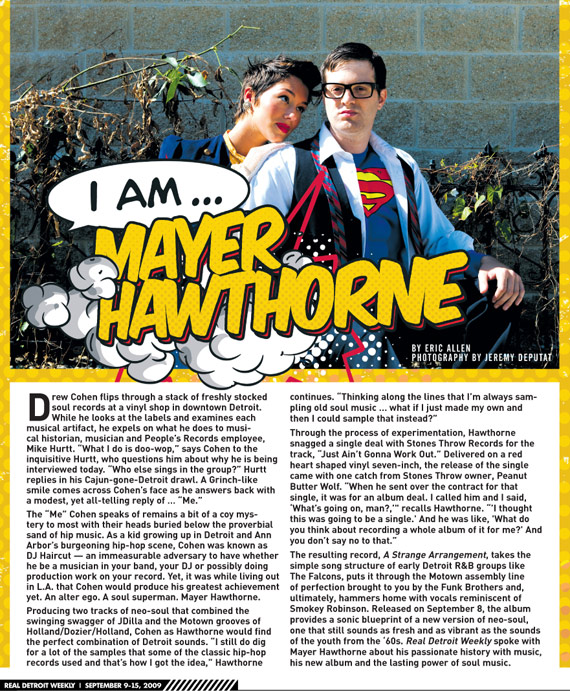Published in Real Detroit Weekly September 9th
Drew Cohen flips through a stack of freshly stocked soul records at a vinyl shop in downtown Detroit. While he looks at the labels and examines each musical artifact, he expels on what he does to musical historian, musician and People’s Records employee, Mike Hurtt. “What I do is doo-wop,” says Cohen to the inquisitive Hurtt, who questions him about why he is being interviewed today. “Who else sings in the group?” Hurtt replies in his Cajun-gone-Detroit drawl. A Grinch-like smile comes across Cohen’s face as he answers back with a modest, yet all-telling reply of … “Me.”
The “Me” Cohen speaks of remains a bit of a coy mystery to most with their heads buried below the proverbial sand of hip music. As a kid growing up in Detroit and Ann Arbor’s burgeoning hip-hop scene, Cohen was known as DJ Haircut — an immeasurable adversary to have whether he be a musician in your band, your DJ or possibly doing production work on your record. Yet, it was while living out in L.A. that Cohen would produce his greatest achievement yet. An alter ego. A soul superman. Mayer Hawthorne. Producing two tracks of neo-soul that combined the swinging swagger of J Dilla and the Motown grooves of Holland/Dozier/Holland, Cohen as Hawthorne would find the perfect combination of Detroit sounds. “I still do dig for a lot of the samples that some of the classic hip-hop records used and that’s how I got the idea,” Hawthorne continues. “Thinking along the lines that I’m always sampling old soul music … what if I just made my own and then I could sample that instead?”
Through the process of experimentation, Hawthorne snagged a single deal with Stones Throw Records for the track, “Just Ain’t Gonna Work Out.” Delivered on a red heart shaped vinyl seven-inch, the release of the single came with one catch from Stones Throw owner, Peanut Butter Wolf. “When he sent over the contract for that single, it was for an album deal. I called him and I said, ‘What’s going on, man?,’" recalls Hawthorne. “’I thought this was going to be a single.' And he was like, 'What do you think about recording a whole album of it for me?' And you don’t say no to that.”
The resulting record, A Strange Arrangement, takes the simple song structure of early Detroit R&B groups like The Falcons, puts it through the Motown assembly line of perfection brought to you by the Funk Brothers and, ultimately, hammers home with vocals reminiscent of Smokey Robinson. The album provides a sonic blueprint of a new version of neo-soul, one that still sounds as fresh and as vibrant as the sounds of the youth from the ‘60s. Real Detroit Weekly spoke with Mayer Hawthorne about his passionate history with music, his new album and the lasting power of soul music.
I know that your parents were both musicians. Did they introduce you to playing music or listening to it first? What came first, chicken or the egg?
It was a little of both. My dad taught me to play bass guitar when I was mad young. My parents were always playing records and I had my little Fisher-Price record player. They would buy me 45’s before I could even read the labels on them … I knew what color it was and I would be like, “Hey, that’s the Isley Brothers,” or “Hey, that’s Earth, Wind and Fire.” My mom made me take piano lessons, which I absolutely hated at the time and I quit, but now I’m super glad she made me do that and go through it.
Was the music they introduced you to vital in what you are now doing with the Mayer Hawthorne project and on A Strange Arrangement?
Yeah. Definitely. That and I vividly remember my dad owned an auto parts store growing up and that was what he did. I would go to work with him on the weekends and I remember driving to work with him and listening to all the oldies and Motown stuff. I would constantly be asking him, “Who’s this one? Who’s that? Who’s that? What song is that?” And he would just tell me everything about it.
What are the seminal records that have made Mayer Hawthorne who he is?
That’s a tough question. Dang, man, that’s tough. This record is very Motown and doo-wop inspired, but one of my favorite records of all time is the Smashing Pumpkins’ Siamese Dream, and I listen to a lot of reggae and hip-hop. You know, I think Slum Village Fantastic Volume 2 influenced me just as much as Smokey Robinsons’ Time Out For Smokey Robinson and the Miracles, which is one of my favorite Motown albums ever. I love all of The Marvelettes stuff … obviously all the Martha and the Vandellas stuff is some of my favorite. All of the girl group songs that Smokey wrote are just my favorites for sure.
Do you try and apply any of the elements of these different genres in your music? Obviously there is the hip-hop connection on the new album, but what about things like the Smashing Pumpkins?
I think it definitely shows up in the music, but it’s not really something that I’m like, "I need to stick in a little Smashing Pumpkins … Billy Corgan right here." It’s just sort of a subconscious thing that I think is kind of impossible for me to not throw a little bit of that in there. There is a guitar solo on “Green Eyed Love” … you know, a wailing guitar solo that you would have never heard probably on a Motown record, but it was what something sounded right to me on that particular song and probably some of that comes from a lot of the heavy metal … I used to be a metalhead, too. I listened to Helmet and Rancid. All of those influences definitely show up on my album — whether it’s conscious or not, probably not as much.
How did you form the Mayer Hawthorne persona and sound?
I was focused on being a hip-hop DJ at the time. I wasn’t interested in making soul music. It was totally just something for fun on the side. I still do dig for a lot of the samples that some of the classic hip-hop records used and that’s how I got the idea — from being a hip-hop producer … thinking along the lines that I’m always sampling old soul music … what if I just made my own and then I could sample that instead? It was really just kind of experimenting just for fun and I never had any plans to record a full album of that material. At first, I didn’t really take it all that serious, even the name Mayer Hawthorne is my porn name. It’s my middle name and the street I grew up on. I wasn’t taking myself very seriously as an artist at the time. I never expected in my wildest dreams it would get to where it is today.
How did you feel about people hearing you sing for the first time since you have never really sang in public before?
Singing is such a new thing for me. It’s crazy. I’m still very much getting the hang of it. I’m not a trained vocalist in any capacity. I never sang in the choir in high school or church or synagogue or any of that and I’ve always been the bass player or the drummer or the DJ. This singing thing is still really new for me. It’s fun … I’m starting to get the hang of it.
How did you find out you could sing like this? Just experimentation?
Totally just messing around. I don’t even know that I’ve discovered my voice yet.
Why do you think soul music has the lasting power it does?
That’s one of the great questions of all time. I think one of the really gripping things about soul music is that it’s generally very deep-rooted from the soul, from your heart. Most of the themes are love related and heartbreak, or themes that people can easily relate to. I think that is a lot of the reason why it never kind of dies. It’s timeless.
Is that something you kept in mind while recording your album?
Yeah, definitely. I was very conscious of creating what I thought would be timeless music. I never really, like, sit down and try to write a song. Usually they just kind of come to me, and a lot of times it feels like I don’t even write them. It’s just like somebody else just beams into my head and it‘s usually at the most annoying time when I’m driving somewhere and I don’t have a way to write it down — I’ll have to call my voicemail, or I’ll be at Target shopping for sheets or something like that. I’ll have to go outside and call my voicemail and sing the song to myself to remember it. I rarely ever sit down and try to write a song … I try not to over think it, but there is always that overlying, timeless feel to everything I do. Hopefully, it stands that test of time and it’s lasting music.
Did it feel like it was a monumental task, creating a whole album of this material when you kind of only did it on a lark to start with?
At first it was a little daunting, 'cause I had never planned on that at all. I never even thought about it. The thought of recording a whole album at first was daunting but I just took it song by song. Luckily, the songs kept coming to me and it got easier and easier as I went along. I could do another whole album next month if I want.
What would you consider success for a project that wasn’t even supposed to come out in the first place?
I mean, I think the potential is unlimited for it. Who knows? Anything can happen. I never expected it to get this far. I think the range of audience that can get into Mayer Hawthorne is extremely wide, there are a lot of high school kids that are digging it, but my grandparents love it, too. In that regard, I think it can hit a lot of people. I told Stones Throw — because they asked me that same question, “What do you want to get out of this album? What is a successful album to you?" — I told them when I have the vinyl LP in my hand and I can put it on the record player and play a vinyl album of myself, then I’m good. That’s success for me. I’m perfectly happy if that is as far as it ever goes. | RDW
Mayer Hawthorne’s A Strange Arrangement is in stores now.
September 10-October 15: Mayer Hawthorne US Tour.

